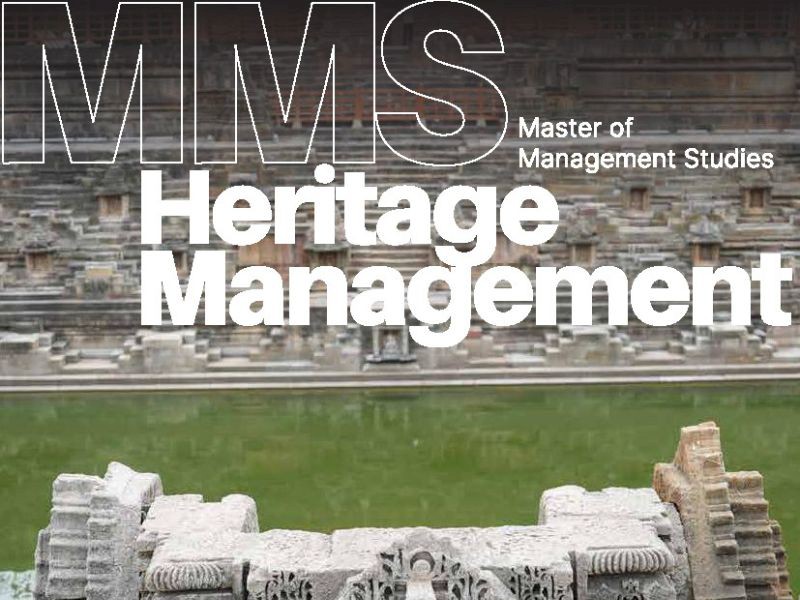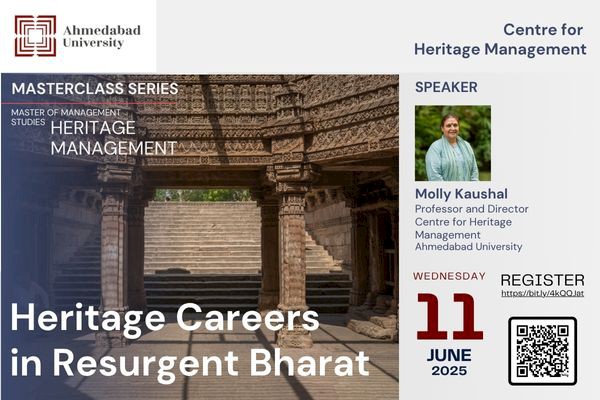Will I get an master’s degree or diploma?
Post completion of the required credits, you will be awarded a Master of Management Studies – Heritage Management Degree from Ahmedabad University. University Grants Commission, in its letter dated 28th July 2010 F.No. 8-13/2010(CPP-I/PU), has notified that Ahmedabad University, Navrangpura (Gujarat) has been established by an Act (No. 8 of 2009) of State Legislature of Gujarat as a State Private University, and is empowered to award degrees as specified by the University Grants Commission under section 22 of the University Grants Commission Act 1956.
What are the unique courses offered in MMS-HM programme?
Heritage Management is a unique programme and all the courses offered are unique in themselves and structured to provide, in addition to the domain knowledge, overall competence required for Heritage Managers.
Does the MMS-HM programme offer industry connect?
Through our Field Immersion Programme and Student Practicum, students get the opportunity to meet, interact, work and leverage from the professionals in the industry.
How is the Programme structured?
The structure is as follows:
| Semester 1 |
Key Conceptual Courses like Heritage Discourses, Conservation, Documentation, Heritage Economics, and so on |
| Semester Break |
Heritage Field Immersion |
| Semester 2 |
Various areas of Heritage Management, like Museums and Archives Management, Urban Heritage Management, Indigenous Knowledge Systems Management, Nature and Environmental Conservation, and so on |
| Summer |
Practicum and Independent Research |
| Semester 3 |
Thesis Proposal and Elective Courses |
| Semester 4 |
Thesis Completion, and Ethics and Professional Practice |
Note: The above is an indicative flow of how a student may progress, but Ahmedabad University has a choice based credit system, which means a student can chart their own course plan and complete the necessary requirements to complete the programme.
Please visit the website for more information
What is the educational background required to apply for the Programme? Should I have studied any specific subjects?
There is no specific background required for entry to this Programme. You must possess a bachelor’s degree from a recognised university in India or abroad. What is important is that you have a self-motivated interest or existing passion for heritage. You should consider whether the Programme is the right one for you and if it aligns with your career goals.
Is there any entrance test or interview?
The selection process includes an admissions test and interview. Shortlisted candidates, based on their application and Statement of Purpose (SoP) are invited for the test and interview.
What is the test about?
Heritage Awareness Survey and Preparedness Test has two components:
- Section 1: Understanding of Heritage Sector – a general awareness test to evaluate the awareness and interest of the candidate in the area of heritage
- Section 2: Experience Related to the Heritage Sector
- Candidates who have pursued any studies or work related to heritage (in any of its manifestations) must submit samples of such work as evidence to support their answers in the awareness and preparedness test.
- For work completed, candidates must upload a digital copy of the report/paper/drawings/ photographs or other related material.
- For work/internship experience, candidates must upload a letter stating the nature and duration of the work.
- For thesis/reports/articles, such documents must be uploaded.
- For course/s taken, please provide the course outline/syllabus, or a summary of what the course/s covered.
The Admissions Committee will use this information to assess the awareness and preparedness of the candidate, which will be taken into account while making admission decisions.
What is the basis of selection for the Programme?
The key purpose of the selection process is to ensure the alignment of the applicant’s interest and the programme objectives. High scores in prior academic work may not always guarantee selection but an awareness of the broader field of the heritage sector and the applicant’s personal inclination towards the sector may make a convincing case.
If one has already been involved with the heritage sector either through earlier student projects and research or through practice and self-experience, it is easy to establish this eligibility. This eligibility will be assessed through the Statement of Purpose and interview as well as portfolio, if applicable.




